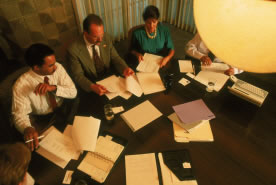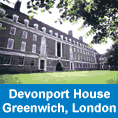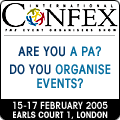

"Well, you just book a room and order some coffee and tea, don't you! What else is there to do?"
A common misconception about putting together meetings, and conference days, and training sessions, and other corporate learning events! There's a lot more to consider, say Meeting Professionals International (MPI), the educational and networking association for meeting and event planners and suppliers.
Before you do anything, make sure you know exactly what and who the meeting is for. What are your client’s characteristics, what are their objectives for holding the meeting? What time of day and year will the event be held? Where are they travelling from? Will they want overnight stays? All these factors will make a difference to the dynamics of your meeting or conference and will be important when selecting a venue, so make sure you know the answers before you begin planning.
Next, and some would say most importantly, is the venue. According to recent research, there are three things at the top of your list when it comes to making your selection:
- Location
- Price
- Access.
The research also shows that corporate organisers are using the Internet and venue finding agencies to track down that special venue, more word of mouth or brochures. This is doubtless due to the pressure of time, and as we all know, anything which saves you time has got to be good news!
So, how do you choose a suitable venue? There are plenty of resources available - and whatever the research says, asking your trusted colleagues does play a part. But with more and more purpose-built conference centres and hotels offering excellent web sites, it is easier than ever to gain information on your preferred venue.
If you have made your choice via a directory or the internet, it is advisable to visit the venue and assess the place for yourself, if at all possible. Although a brochure or a virtual tour can give you a feel, they do not allow you to view the exact room size, or see what the lighting or air quality is like, nor the general quality of the facilities. A glossy brochure, no matter how informative, cannot tell you how friendly the staff are or how sympathetic to your needs they may be.
Pick your venues wisely. Once you know what sort of meeting you are planning, ensure the venue has the size and the facilities you need. Check that what the hotel or venue refers to as "break out rooms" will really hold as many delegates as you will be inviting, and that when the brochure says the restaurant is "near to" the ballroom, it doesn't really mean a six minute walk through the car park! (It happens!)
Try, too, to build a close working relationship with your venue managers, to ensure you get the most co-operation from them; they can be an enormous help. Tap into their knowledge of their venue, and their experience with previous clients.
Refreshments will be very important to your client and their delegates. If your venue has an in-house catering department they will probably have a good idea of what works. External caterers can be a good option too - listen to their advice, as they know their job. Communicate with them, ask to see and taste samples of the dishes they plan to serve, make sure you are aware of what they are planning and that they are aware of what you expect.
Think about how you can add dynamism to your meeting or event. That could be from using a specialist Audio Visual team to create theatre in your presentations that will excite your audience's imagination, or by using state of the art interactive voting systems to really engage them. Maybe you could give the conference a theme, be that a logo or colour or identity, which will help delegates feel a part of an exciting event. Just think how much more impressive a training event would be at the Science Museum in London, with a space age Audio Visual set up, a celebrity scientist speaker, and interactive voting! Obviously, your budget plays a part, but try always to look for ways of enlivening your event.
Make sure you build around you a great group of people, to whom you can delegate when you need to. You need to trust the people you are working with; no-one expects you to do it all. You will need a good well-organised and self-motivated team around you - even if you only bring them in at the last minute to compile conference packs, or to help you on the day.
Once the day arrives, your role should be a simple one of monitoring that everything you organised arrives as planned, and as a communication point for the venue's team. You need to be free to ensure that your delegates are getting what they need from the event.
And finally, try and ensure you get feedback on the meeting and the venue from the delegates. The best way to do this is to make it easy for them to respond to you. talkIQ is a company that enables delegate participation and feedback during, before and after meetings, simply by using their mobile phones. As it’s so easy and does not cost them anything, the response rate is very high. Check out the service at www.talkiq.com
Assessing how the event went is vital, to measure your return on investment, and to look for improvements for next time. Provide feedback forms, or arrange review meetings with key suppliers and clients. MPI runs regular courses to help meeting planners assess the success of their events in terms of the value that was delivered, as well as the information.








